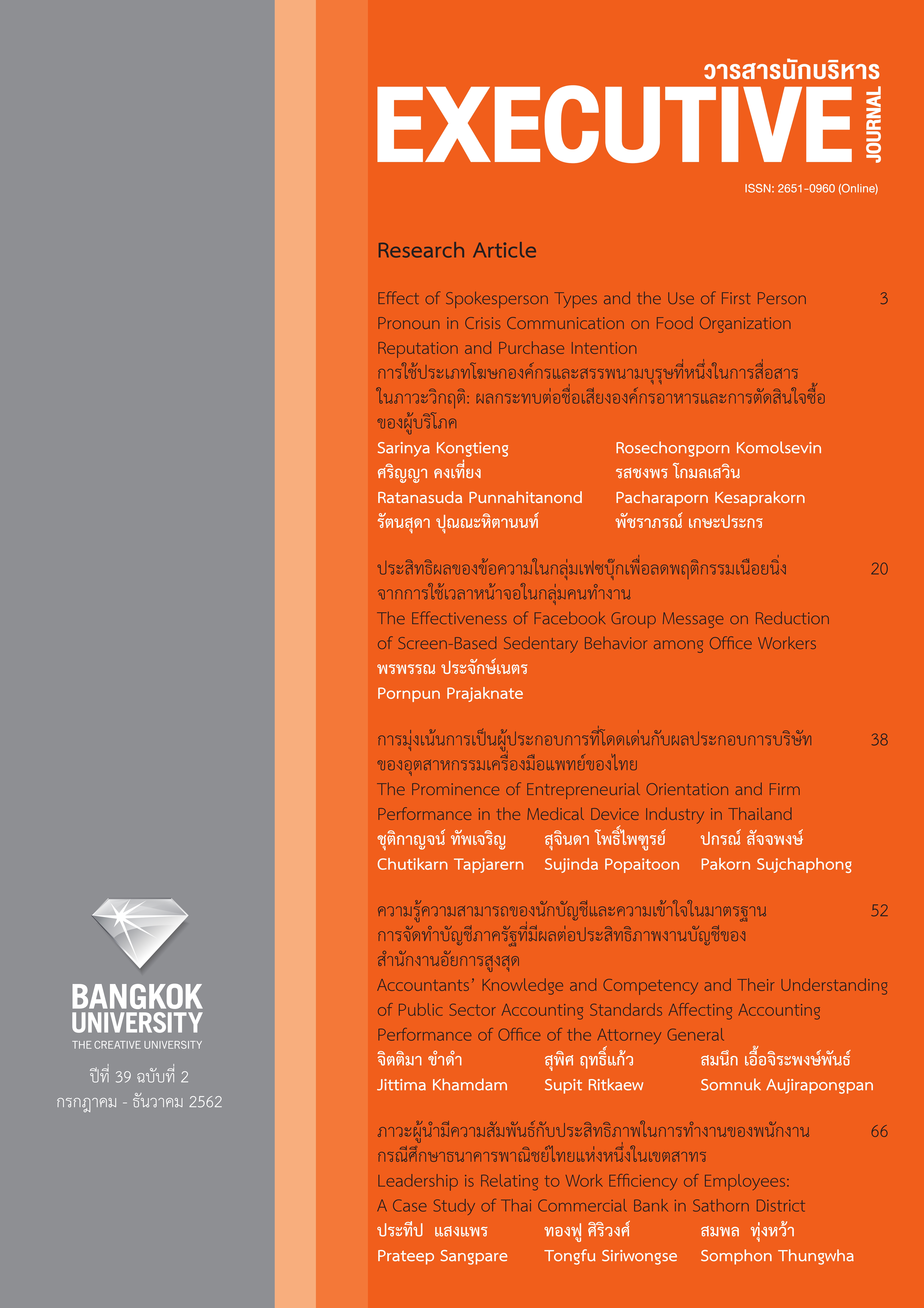Leadership is Relating to Work Efficiency of Employees: A Case Study of Thai Commercial Bank in Sathorn District
Main Article Content
Abstract
The research objectives are: (1) to study the transformational leadership; (2) to study the work efficiency of employees; (3) to compare work efficiency of employees categorized by personal factors; and (4) to study the relationship between transformational leadership and work efficiency of employees. The sample used in this research was 240 employees of a Thai commercial bank in Sathron District Bangkok which was obtained by using the convenience sampling method. A questionnaire was used as a research tool, and the statistics used in data analysis include frequency, percentage, mean, standard deviation, t-test, one-way ANOVA, the pair-wise test according to the LSD method at the statistical significance level of 0.05, and Spearman’s correlation coefficient. The results showed that: (1) The overall transformational leadership was at the highest level in all aspects; (2) The overall work efficiency of the employees was at the highest level in all aspects; (3) Except for gender, the employees with different personal factors including age, education level, working periods and income are different in terms of the overall performance at the 0.05 statistical significant level; and (4) Transformational leadership and work efficiency of employees is positively correlated at a moderate level with statistical significance at 0.05 levels
Article Details
The manuscript submitted for publication must be the original version, submitted only to this particular journal with no prior acceptance for publication elsewhere in other academic journals. The manuscript must also not violate the copyright issue by means of plagiarism.
References
Achawananthakul, S. (2017). Ngānwičhai kāntœ̄ptō khō̜ng Fintech kap ʻōkāt kānsāng sētthakit thī phatthanā yāng thūathưng [Research for fintech's growth and the opportunity to create a thoroughly developed economy]. Retrieved July 15, 2019, from https://www.salforest.com/knowledge/fintech-financial-inclusion
Bass, B. M. (1985). Leadership and performance beyond expectations. New York: Free Press.
Bass, B. M., & Avolio, B. J. (Eds.). (1994). Improving organization effectiveness through transformational leadership. Thousand Oaks, CA: Sage.
Bertocci, D. I. (2009). Leadership in organizations: There is a difference between leaders and managers. Lanham, MD: University Press of America.
Chongvisal, R. (2000). Kānsưksā phāwa phū nam læ thitthāng mai phư̄a kānphatthanā phūprakō̜pkān SMEs [The study of leadership and new direction for developing SMEs entrepreneurs]. Journal of Development Administration, 50(1), 81-99.
Kinicki, A., & Fugate, M. (2016). Organizational behavior: A practical, problem-solving approach. New Jersey: Mc Graw Hill.
Phoomsri, C. (2018). Phāwa phū nam samrap phūbō̜rihān ʻongkān: Nǣokhit thritsadī læ kō̜ranī sưksā [Leadership for executives: Concepts, theories, and cases]. Bangkok: Panyachon
Publisher.
Plowman, G. E., & Peterson, E. (1960). Business organization and management. Queensland: Irwin.
Somsang, S. (2011). Phāwa phū nam kān plīanplǣng khō̜ng hūanā ngān thī mī khwāmsamphan kap prasitthiphāp kānthamngān khō̜ng phanakngān bō̜risat čhathā ngān khām chāt hǣng nīngõ [The relationship between supervisors transformational leadership and employees’ efficiency of multi-national recruitment company] (Master thesis’s, Srinakharinwirot University).
Song, J. H., Kolb, J. A., Lee, H., & Kim, H. K. (2012). Role of transformational leadership in effective organizational knowledge creation practices: Mediating effects of employees' work engagement. Human Resource Development Quarterly, 23(1), 65-101.
Suban, W. (2011). Khwāmsamphan rawāng phāwa phū nam kān plīanplǣng kap kānbō̜rihān ngān bukkhon khō̜ng rōngrīan sangkat Krung Thēp Mahā Nakhō̜n klum krung thana tai [The relationships between transformational leadership and the personnel administration in primary schools under Bangkok Metropolitan Administration of Southern Krungthon Group] (Master thesis’s, Dhonburi Rajabhat University)
Sungphaya, C., & Srisopha, Y. (2017). Phāwa phū nam kān plīanplǣng khō̜ng phūbō̜rihān sathān sưksā thī song phon tō̜ prasitthiphāp kānthamngān pen thīm khō̜ng khrū sangkat samnakngān khēt phư̄nthī kānsưksā matthayommasưksā khēt 9 [Transformational leadership of school administrators effected on the efficiency of working a team of teachers under the Jurisdiction of Secondary Educational Service Area Office 9]. Silpakorn Educational Research Journal, 8(2), 318-333.
Thitikunrat, K. (2013). Prasitthiphāp kān patibat ngān khō̜ng phanakngān bō̜risat sanchai intœ̄nēchannǣn čhamkat [The staff performance efficiency of employees in Sunshine International Company Limited] (Independent Study, Rambhai Barni Rajabhat University).
Wangpanich, P. (1983). Kān watphon kānsưksā [Educational evaluation]. Bangkok: Thai Wattana Panich Publication.
Wongkrajang, P. (2014). Itthiphon khō̜ng phāwa phū nam bǣp kān plīanplǣng tō̜ prasitthiphāp kānthamngān: Kō̜ranī sưksā bō̜risat ʻemphīʻem theknōlōyī ( thailǣn ) čhamkat [Influences of transformational leadership on performance efficiency: A case study of MPM Technology (Thailand) Company Limited] (Master thesis’s, Rajamangala University of Technology Thanyaburi).
Yamane, T. (1973). Statistics: An introductory analysis. New York: Harper and Row.


